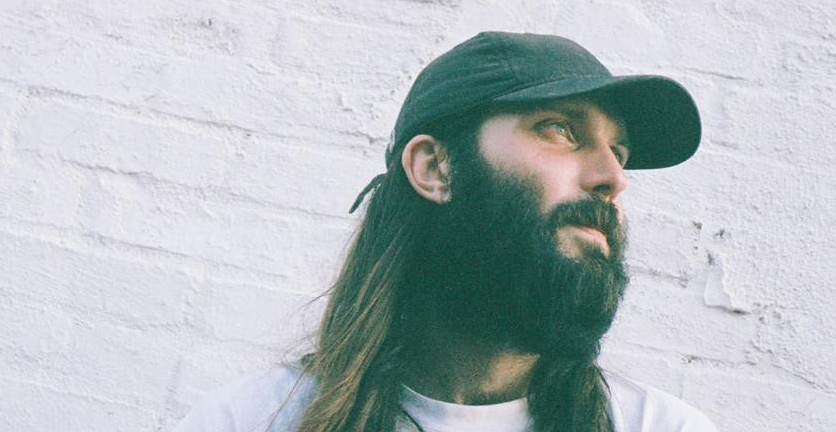Music
 Rick Irby // Photo: Rob Stokes
Rick Irby // Photo: Rob Stokes
Behind the Scenes with Local Industry Insiders
November 2, 2019 @ 12:00am
It takes tons of people to galvanize and make music happen, both on the stage and in the background, and we let some of these local music industry professionals tell us all about their roles and responsibilities when set time rolls around.
Angelie Benn, Founder of Capitol Sound DC

Angelie Benn // Photo: www.miyewirellc.com
On Tap: How embedded were you in the DC music scene pre-blog?
Angelie Benn: I basically started this blog in high school in 2014 because I wanted to go to concerts. I had no idea what I was doing, but eventually I ended up going to a lot of local shows. I met a lot of people who were making music too – collectives and bands. I started going to the local DIY shows and stuff. Then I got involved with the community from there.
OT: What kinds of things did you learn through the blog?
AB: When I started throwing shows for the blog, I was very inspired by Chicago’s garage rock DIY scene but found that DC’s [was] more experimental. DIY in DC is mostly black experimental artists ranging from jazz [and] hip-hop to electronic.
OT: What did you think it would cover, and how did that change?
AB: Well, at first with the writing, it was my scope. I did it because I couldn’t afford to go to concerts, so I was writing whatever I wanted to write about. It was hella fan girl stuff. When I started to grow, I realized I had a community I was committed to, so it has changed.
OT: What about your own promoted shows? What kinds of things do you think about as a curator?
AB: I try to include queer people and LBGTQ people. It’s important to make that statement. Shout-out to Songbyrd because they’re very inclusive. A lot of other venues are bland, so my intention is to shed a light on people who are underrepresented.
OT: How important do you think blogs like this are for the DC music community?
AB: I feel like people really look forward to the things we do. We try to cover underrepresented groups of people, so they have that outlet and a place to build community. I think that’s what we hear a lot: that we cultivate a place to come and have their voices heard.
OT: As a person who has a wide view of the local music scene, what do you think the state of it is?
AB: Over the last two or three years booking shows, we’ve cultivated that community. To me, the DC music scene looks so much different than what it was five years ago. I don’t feel like it’s peaking, but it’s getting close.
Check out Capitol Sound DC at www.capitolsounddc.com
Antonio Hernandez, Documentarian and DJ

Antonio Hernandez // Photo courtesy of Antonio Hernandez
On Tap: What does your current work in the DC music scene encompass?
Antonio Hernandez: The main thing is Indelible, a documentary project. It encompasses web shorts of artists [and] curators. Every time I show the film, I recut it because I’m continuously working it out. I’ve been filming a lot.
OT: You also blog with interviews and reviews, right?
AH: I basically started in blogging in my off time. [This] started about five or six years ago. I also had a short web series called Garnish where I interviewed artists and other performers as well.
OT: Why do you think it’s such an interesting subject to emphasize in your projects?
AH: I think because it’s so diverse. There are so many artists who are taking their artistry into their own hands. Before, there weren’t the tools like social media, Spotify [and] Bandcamp. Those weren’t prevalent 10 years ago. Now people are making music and connecting with people. Whether it be established venues like Songbyrd and 9:30 Club or house and pop-up shows at places like Dwell.
OT: What’s the decision process for who your films follow?
AH: A lot of [them] are artists that I know or find through lineups. If there’s an artist I know on a show, they’ll introduce me to three or four other artists. I do everything for it. I do scheduling [and] videotaping. I try to get footage of anything the artist is comfortable with and what they want me to be present for.
OT: How did you get into documentaries? What’s your origin story?
AH: It was mostly DIY. I started with photography when I was studying abroad. Before that, I hated taking pictures. It really opened my eyes. I got to see the shapes in nature and basic composition. From there, I did short video projects at Towson University. My last year there, I took a visual anthropology class and that introduced me to documenting things.
OT: You’ve received a lot of press for Indelible. What’s the next step for you creatively?
AH: With Indelible, I’d like to screen it in other countries and cities. I’d like to do videos like that in other countries as well. For instance, my family is from Peru, and I’d love to do something like this there.
For more information about Antonio Hernandez and Indelible, visit www.electric-llama.com.
Rick Irby, Production Manager + Head of Sound at Pie Shop

Rick Irby // Photo by Rob Stokes
On Tap: What is your background and how did it lead you to your current role as production manager and lead sound engineer at Pie Shop?
Rick Irby: After 10+ years of performing and making records with DC bands, I found myself having a deeper respect for the people behind the scenes making it all happen. From the sound engineers to the venue and bar staff, I realized that all of these people are contributing so much to us musicians doing our thing. Before a show I randomly opened up to Sean Gotkin, Sound Department Manager at Black Cat, about how much I appreciate his role at black cat and the DC music community.
I eventually asked him if he was willing to teach me how to transition from studio work to live sound engineering. After a month or so of training, I was extremely humbled and honored to work the Black Cat Backstage in its final 6 months. By the end of the season I started to work more shows at DC9 and a new venue on H Street, Pie Shop. I couldn’t help but love the small venue vibe at Pie Shop and signed on as Production Manager and Head of Sound in February. I’m very fortunate to be working with so many great artists and it’s a true pleasure to provide bands with a great environment and sound quality that respects their years of dedication to making music and making audiences happy.
OT: Describe a typical day in the life of your role at Pie Shop.
RI: At 5 p.m. the bands show up to load and soundcheck. We take as much time as necessary to make sure every instrument is dialed in for each band and offer up some free pies before doors. Showtime is usually at 8 p.m., and it’s my job to keep all performers and equipment in mind so we can have a smooth show. Working with new artists every night will remind you that every concert is different and deserves as much respect and attention to detail as possible.
OT: I know you play in other local bands and projects. Can you tell me more about that aspect of your life and your current projects?
RI: For the last five years or so I’ve been drumming with Den-Mate and Wanted Man. Den-Mate is a dark-wave band led by Jules Hale and Wanted Man is straight up rock ‘n’ roll featuring Kenny Pirog, Anthony Pirog and Scoops (who also bartends at Pie Shop). I recently joined Rob Stokes and Sir E.U’s project, October ’71, on bass and assist in producing records with them. I also have a soon- to-be-released record, “Post-Sadboi Funk” under my producer moniker, Jau Ocean. The record has been evolving for almost 3 years and features a handful of DC artists lending their talents. Lastly, a huge shout out to Paperhaus, which was a life-changing band for many people and gave me a homebase to learn how to throw DIY shows and meet so many of the people that I work with today.
OT: How do your experiences in those projects inform or influence your job at Pie Shop?
RI: I try to give the Pie Shop artists what I would appreciate myself as a performer. I know how difficult it is to be on the road and/or fighting DC traffic to get to the gig. It is a tremendous boost when you feel like a venue or sound tech cares about you and your art. I try to hold myself to that standard as much as possible knowing that many other venues and engineers have done the same for me and my friends.
OT: What do you think makes Pie Shop unique?
RI: Personally I prefer going to small concerts and usually find myself supporting up-and-coming bands to groups that have already “made it.” Pie Shop gives these emerging artists an opportunity to get great sound and grow a fan base. I also love how Pie Shop does not stick to any particular genre. Every show is different, and there are always new people to meet and learn from.
OT: What’s an aspect of your job that someone may not realize falls under your role?
RI: As the production manager, I am in charge of emailing every band the venue specs and to help troubleshoot any requests or unique variables pertaining to the show. This can often mean weeks of preparation via email and/or last minute problem solving in front of sold out crowds. It can be stressful, but it is always worth it by the end of the night to see the culmination of everyone’s hard work and focus.
OT: What’s the most challenging part of your role, and how do you overcome it?
RI: I think the toughest part of the job is internal… knowing that I am in charge of the entire show and all the moving parts. It’s controlled chaos. Running a venue involves a Zen-like understanding that we are doing this right now, live. Good or bad, anything can happen at any moment. Which can be scary, but also a challenge that keeps you on your toes.
OT: Any advice for someone looking to get into sound engineering/similar roles?
RI: Go for it! If you like working with people and love music, look into local venues that may need assistants and start to research and learn. I would also recommend that musicians should think about becoming live sound engineers and/or working at venues. It is so enlightening to see professional and amateur musicians alike from the other side of the board. In my experiences, I have found a much greater sense of patience and understanding for all aspects of throwing concerts and I hope it has helped me mature as a person and performer.
OT: What’s your favorite part of the DC music scene?
RI: I love how there isn’t a “DC sound.” Every band has their own thing going on and I love being a part of such a supportive community with such strong bills.
OT: Anything else I didn’t ask about that you’d like to mention?
RI: I would like to thank the owners Sandra and Stevie for giving me this great opportunity at Pie Shop. I hope that all of our performers and audiences can feel the time and devotion that they have put into creating such an amazing restaurant, bar and venue. Thank you to Pie Shop Staff for being the coolest and Jon Weiss for booking such amazing acts. A huge thank you to my sound mentors Kenny Pirog, Mel at DC9, Sean and Elisa at Black Cat, Chris Moore and Dennis Manuel. And of course, all of the Pie Shop and DC music supporters and audience members – thank you! Looking forward to seeing you all at some shows.
Catch Pie Shop’s full lineup of upcoming shows at www.pieshopdc.com. For more on Irby and his other projects, see below.
Den-Mate: www.den-mate.bandcamp.com
Jau Ocean: www.soundcloud.com/jauocean
Wanted Man: www.wantedman.bandcamp.com
Pie Shop: 1339 H St. NE, DC; www.pieshopdc.com







